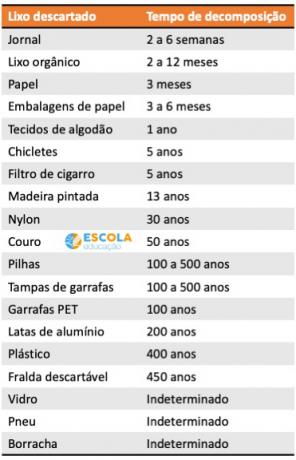
O garbage decomposition time depends entirely on the material being discarded. Decomposition occurs when the trash transforms into other substances that can be reabsorbed by the soil through processes chemicals.
The composition and size of discarded waste, as well as factors climatic where it is found, determine the variation in the time of decomposition.
see more
Biology teacher fired after class on XX and XY chromosomes;…
Cannabidiol found in common plant in Brazil brings new perspective…
Materials such as glass take hundreds of years to completely decompose, whereas paper only needs a few months to disappear from the environment.
It is important to remember that, regardless of the decomposition time, all waste must be disposed of in the correct places, as it can cause damage to the environment and, consequently, to living beings.
Check out one of the following garbage decomposition time table:

Waste that takes a short time to decompose is called biodegradable waste.
Organic remains, paper and some fabrics are considered biodegradable and during decomposition release molecules of carbon dioxide (CO2), water (H2O), methane (CH4) and ammonia (NH3).
Materials that are not biodegradable can take thousands of years to decompose, so they must be sent to the recycling in order to avoid the accumulation of garbage in the environment.
The inappropriate disposal of non-biodegradable waste can cause social, environmental and public health.
In addition, the soil and rivers can be contaminated, animals can try to feed on these residues, such as plastic materials, and suffocate to death, causing serious imbalances in the environment. ecosystems.
The three R's rule concerns three words:
Following this idea of conscious consumption, it is possible to carry out actions that reduce the amount of waste produced and, consequently, conserve the environment.

To reduce the waste produced, simple actions such as taking a returnable bag to the market and avoiding the use of disposable materials are good options.
Reuse can be applied with small gestures such as passing on clothes that you no longer use to someone who needs it or give a new use to an object that is sitting around the house, like a glass turning into a pencil holder.
A recycling it must be made with all materials that can be transformed into something new, saving energy, water and raw materials. The majority of papers, plastics, glasses and metals can be recycled.
See too:


